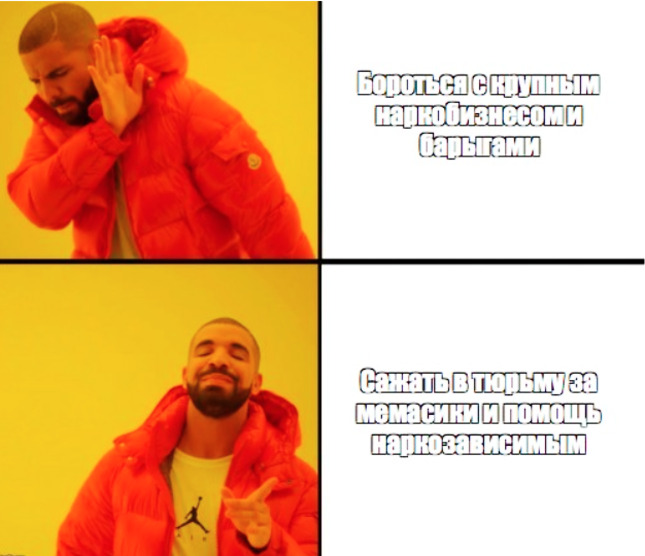Russian President Vladimir Putin proposes to toughen anti-drug laws and add criminal punishment for propaganda of drug use online. In addition, he proposed to block online information about drug preparation schemes and sites of drug distribution without a court warrant.
The Kremlin’s official web-site published the President’s commission to introduce changes to the Russian legislation regarding the “non-judicial access restrictions to online information about means of production and utilization of narcotic substances and new potentially dangerous psychoactive substances as well as about sites of their distribution.”
Specific penalties for the proposed initiative must be developed by the Cabinet of Ministers.
In the Russian Criminal Code there are currently no references to any online propaganda of drugs, but article 230 of the Criminal Code envisages incarceration for 10 to 15 years for drugs propaganda in relation to minors or in cases when such propaganda allegedly leads to death or other serious consequences.
Members of the Council of the Federation of the Russian Federation (the upper house of the Russian Parliament) supported the initiative. Senator Andrey Klishas even proposed to introduce punishment for online propaganda of drugs – a prison sentence for 5 to 15 years. “Taking into consideration that crimes conducted in the internet are conducted by the undefined circle of people, these crimes may be equalled to the article 230 part 2 and punished by the 5 to 15 years of imprisonment. In case of hard consequences, sanction may be increased to 10 to 15 years”, — “Kommersant” reports.
In just two days after the Presidential initiative, MPs from the “Just Russia” political party introduced a draft law on the criminal punishment of propaganda and advertisement of drugs on the internet – for 2 to 5 years of imprisonment for propaganda and advertisement of drugs, and in case of online propaganda – for 5 to 7 years in prison. One of the draft law authors Sergey Mironov told “Interfax”: “There are no unharmful drugs. Those who spread this myth are criminals similarly to drug dealers. And they must be punished respectively.”.
Perhaps the lawmakers moved too fast – within a couple of hours the Head of the State Duma Committee on Legislation, Pavel Krashennikov, announced that the draft law had been withdrawn and sent back to the authors, because it lacked legal recommendations from the Cabinet and the Supreme Court, which is against the formal procedure. Additionally he mentioned that the dissemination of the document was a “PR-move to attract attention”, AIDS.centre reports.
While the draft law is being amended, Russian public health experts and activists working in the field of harm reduction consider the new legal initiative to be extremely dangerous and inefficient.
Aleksey Lakhov, deputy director of the Charity Fund “Humanitarian Action” from St. Peterburgh, believes that the will to impose sanctions on the online channels of drug distribution is understated, given the current situation in Russia with the rise of darknet drug market.
Lakhov suggests that fines should be introduced rather than criminal punishment. Essentially, it is important to provide a clear framework for what constitutes propaganda. “Because, as it usually happens, what one expert would qualify as propaganda, the other will not. We are afraid that many heads will fall off in vain.”, — OpenMedia reports.
While non-goverment organizations, which provide help to people who are drug dependent, will spend time proving their innocence, many of their clients will be left without assistance and access to harm reduction services, the activist warns.
Ivan Varentsov, who represents the Andrey Rylkov Foundation, which also provides harm reduction services and information to drug users, states that considering the broad notion of propaganda, all kinds of online information about how to decrease risks of drug use, information about safer drug use practices and how to avoid HIV and other infections are at risk of being outlawed.
The popular Russian Telegram-channel “DrugStat”, is convinced that the new legal initiative will primarily hit foundations and harm reduction services. Their websites often publish stories of people who use drugs and who overcame chemical dependency, and these stories are a perfect match for the norm of “online propaganda of drugs”. Further, admins of VKontakte publics with memes about drugs will be hit by the new law, with Telegram channels to likely follow. “We will all be under threat of receiving 7 years of jail for a post about medical marijuana or a meme about mephedrone.”
The editor-in-chief of Lenta.ru media outlet, Vladimir Todorov, also commented on the new presidential initiative. As a result of the adoption of the new law, “first of all attempts of adequate public discussions regarding the country’s drug policy will be placed at risk. I am not sure the law will greatly influence darknet marketplaces, which sell drugs online”, Business FM quotes Todorov. Lenta.ru published a detailed analysis of the Russian darknet: “Very dark affairs”. The media’s articles about investments into legal market of marijuana in the US have been previously banned by the Russian authorities.
According to Arseniy Levinson, expert of the Institute of Human Rights, the introduction of criminal penalties for drug propaganda is simply a continuation of the War on Drugs, which has failed to stop supply and demand. “Such an initiative cannot influence the accessibility of drugs. Besides, any criminal responsibility for words, public statements and opinions leaves a lot of room for interpretation. We do not know at the moment which definition of propaganda will be proposed in the law. But in any case such interpretation will be carried out by linguists and psychologists hired by the police.
“The propaganda norm may become a useful tool of persecution of all critics, who call for humane and efficient drug policy in Russia. The new law will definitely create new social problems instead of solving old ones.” — AIDS.centre reports.
According to Radio of Liberty, every 4th inmate in Russian prisons is convicted for drug offences. In 2017 around 102, 217 people were found guilty for drugs offences.


